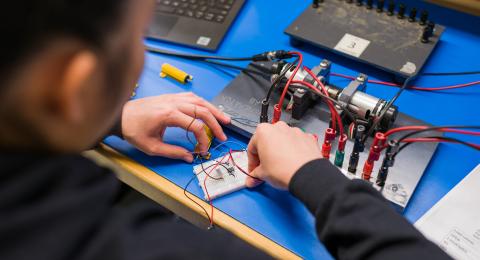The Electrical and Computer Engineering minor at UNH introduces you to electronics and software integration, focusing on circuit design, testing, and modeling. This minor complements majors in sciences, engineering, and computer fields, preparing you for advanced studies or careers in diverse fields. At UNH, you'll gain hands-on experience in state-of-the-art labs and the renowned InterOperability Lab, where you’ll test networking equipment with top tech companies. This practical experience enhances your career prospects in areas like aerospace, AI, and telecommunications.
What is electrical and computer engineering?
The minor in electrical and computer engineering will introduce you to the fundamentals of electronics technology and mergingelectronics systems with software. You’ll study electrical circuits and how to control them with software. You’ll study the fundamental concepts of the design, development, testing and modeling of a wide range of electrical systems. By combining skills and technological expertise learned in this minor with majors in the sciences, education, engineering or computer fields, you can leave this program prepared to succeed in graduate studies or a variety of career fields.
Why study electrical and computer engineering at UNH?
In the electrical and computer engineering program, you’ll work in a hands-on laboratory environment that reinforces traditional classroom learning while providing the real-world skills valued by employers. You can participate on competitive teams at national competitions and gain hands-on experience at the UNH Inter Operability Lab, where you’ll work alongside top tech companies to test their networking equipment before it hits the market. The computer and electrical engineering program at UNH has a high placement rate because of its great reputation among industry employers.
Potential career areas
- Advanced manufacturing
- Aerospace
- Artificial intelligence
- Biomedical engineering
- Computer systems
- Education and research
- Patent law
- Semiconductors and IC design
- Telecommunications
Curriculum & Requirements
The Department of Electrical and Computer Engineering encourages highly motivated students outside of the ECE department are encouraged to consider a minor in Electrical and Computer Engineering.
For additional information please contact the ECE Department. Our ECE Minor Faculty Advisor will be happy to answer any questions and help you select courses that best fit your career goals.
Academic policies related to Minors.
Credit toward the minor will only be given for courses passed with C- or better, and a 2.00 grade-point average must be maintained in courses for the minor.
- Courses taken on a pass/fail basis may not be used for a minor.
- No more than 8 credits used to satisfy major requirements may be used for the minor.
- No more than 2 courses or 8 credits may be from transfer coursework. Any transferred coursework must be approved by the minor coordinator.
For additional details on how to declare a minor, please visit https://www.unh.edu/registrar/academic-records/majors-minors.
Required Courses
| Code | Title | Credits |
|---|---|---|
| ECE 541 | Electric Circuits (or ECE 537 with grade of A/A-) | 4 |
| ECE 548 | Electronic Design I | 4 |
| ECE 543 | Introduction to Digital Systems | 4 |
| Two additional approved ECE courses (500 level or higher) approved by the ECE Undergraduate Curriculum Committee. | ||
Explore Program Details
Interested students should complete the provided application form and submit it to the ECE Undergraduate Curriculum Committee (Kingsbury W201) during his/her sophomore or, at the latest, junior year. After it is approved, the student will need to fill out an “Intent to Minor” form, available from the Associate Dean’s office (Kingsbury W283) in order to make entry into the minor program official. It is also the student’s responsibility to submit a “Minor Certification of Completion” form after all the minor courses have been taken, but before graduation.















